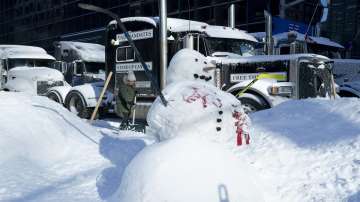Canadian police arrests protesters in Ottawa
The emergency law enabled law enforcement authorities to compel tow truck companies to assist.

Police began arresting protesters and towing away trucks Friday in a bid to break the three-week, traffic-snarling siege of Canada's capital by hundreds of truckers angry over the country's COVID-19 restrictions. Working slowly and methodically, police led protesters away in handcuffs through Ottawa's newly snow-covered streets, with at least one of those under arrest carrying a sign that read, “Mandate Freedom.”
Tow truck operators - wearing neon-green ski masks, with their companies' decals taped over on their trucks to conceal their identities - arrived under police escort and set to work removing the big rigs, campers and other vehicles parked bumper to bumper. While some protesters surrendered, many remained defiant as the crackdown unfolded.
“Freedom was never free,” said trucker Kevin Homaund, of Montreal. “So what if they put the handcuffs on us and they put us in jail?” Police made their first move to end the occupation late Thursday with the arrest of two key protest leaders. They also sealed off much of the downtown area to outsiders to prevent them from coming to the aid of the self-styled Freedom Convoy protesters.
The capital represented the movement's last stronghold after three weeks of demonstrations and blockades that shut down border crossings into the US, caused economic damage to both countries and created a political crisis for Prime Minister Justin Trudeau. They also shook Canada's reputation for civility, with some foes of the unrest blaming the influence of the United States.
Over the past weeks, authorities had hesitated to move against many of the protesters around the country, in part for fear of violence. The demonstrations have drawn right-wing extremists and veterans, some of them armed. With police and the government facing accusations that they let the protests gain strength and spread, Trudeau on Monday invoked Canada's Emergencies Act, giving law enforcement extraordinary authority to declare the blockades illegal, tow away trucks, arrest the drivers, suspend their licenses and freeze their bank accounts.
The emergency law also enabled law enforcement authorities to compel tow truck companies to assist. Ottawa police said earlier that they couldn't find tow truck drivers willing to help because they either sympathised with the movement or feared retaliation.
As police worked to dismantle the siege, Pat King, one of the protest leaders in Ottawa, told truckers, “Please say peaceful," while also threatening the livelihoods of the tow truck drivers. “You are committing career suicide,” King warned on Facebook. “We know where the trucks came from.”
Ottawa police had made it clear on Thursday they were preparing to end the protest and remove the more than 300 trucks, with the city's interim police chief warning: “Action is imminent.” The operation Friday in Ottawa began in the morning with police arresting protesters a few blocks from Parliament Hill, the heart of protest zone, where trucks were parked shoulder to shoulder. Some officers carried automatic weapons and wore tactical unit uniforms.
Even as the operation unfolded, police issued yet another round of warnings to the truckers, giving them a last chance to leave. Not long after the arrests began, at least one big rig pulled away near the front of Parliament. But despite warnings to leave posted by police on social media, a few protesters danced in the streets to the Beastie Boys anthem ”(You Gotta) Fight for Your Right (To Party!)” and Bob Marley's “Get Up, Stand Up,” while shouting, “Freedom!” The two protest leaders under arrest were due in court Friday. Among the charges: mischief and obstructing police.
The bumper-to-bumper occupation infuriated many Ottawa residents, who complained of being harassed and intimidated on the streets and obtained a court injunction to stop the truckers' incessant honking of their horns.
The demonstrations around the country by protesters in trucks, tractors and motor homes initially focused on Canada's vaccine requirement for truckers entering the country but soon morphed into a broad attack on COVID-19 precautions and Trudeau's government.
The biggest border blockade, at the Ambassador Bridge between Windsor, Ontario, and Detroit, disrupted the flow of auto parts between the two countries and forced the industry to curtail production. Authorities lifted the siege last weekend after arresting dozens of protesters. The final border blockade, in Manitoba, across from North Dakota, ended peacefully on Wednesday. The protests have been cheered on and received donations from conservatives in the US.
Also Read | Ottawa’s police chief ousted amid truck protest in Canada
Also Read | Canada invokes Emergencies Act first time in 50 years to quell protests against COVID restrictions